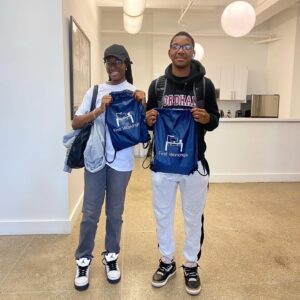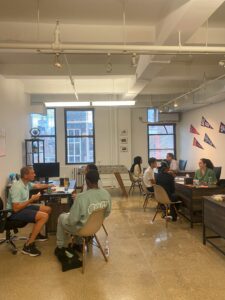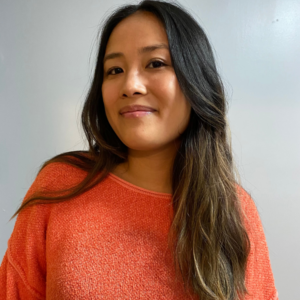Renee Bellis, Feedback Labs | March 12th, 2024
At Feedback Labs, we collect stories of good feedback practice from organizations in our community. One way that we do that is by interviewing past participants in our Feedback Crash Course to hear how they’ve strengthened their feedback loop since the course ended.
Earlier this year, we interviewed Linda Nguyen, Executive Director at First Workings, a participant in the April 2023 Crash Course sponsored by the Siegel Family Endowment. First Workings supports high achieving, high potential students from some of New York City’s most underserved and underrepresented communities to gain social capital and workplace readiness skills. The nonprofit works with 20 schools to identify high achieving students to attend training in workforce readiness and be connected to a mentor in the students’ industry of interest. 
After attending the Crash Course, Linda told us that “Feedback is now at the core of what we do and at the forefront of what we do. It is what we think about as we are evolving our core program and alumni programming.”
Strengthening Existing Feedback Process
First Workings used the Crash Course to analyze their current feedback processes. The nonprofit was already regularly distributing Google surveys to students and guidance counselors about their programs. But following the course, Linda and her team took a closer look at the existing feedback process and considered, “why are we asking these survey questions,” and “what outcomes do we want from our work that feedback can help us get to?” After learning about the feedback loop in the Crash Course, First Workings made the following changes to their existing feedback process.
- Asking specific, actionable questions: The existing surveys had open ended questions like “What can we do better?,” but First Workings realized they could collect more specific data about what stakeholders wanted to see from the program by framing questions like: “Here is a list of our existing workshops. What other workshops would you like to see included?” and “What support are you not receiving in school that you would like to see in our program?”
- Collecting richer demographic data: While First Workings was already asking for some demographic data, for example, “Do you identify as a person of color?,” the team realized that they weren’t asking other questions that would give them a more complete picture of their students’ background and experience. For example, they have begun asking “Do you qualify for free or reduced lunch?” to understand how income relates to a students’ experience in the program.
- More inclusive feedback collection: First Workings realized that it had primarily been collecting feedback from guidance counselors that they engaged with most. In order to create a more inclusive process, the organization has begun surveying all of its guidance counselors.

- Using analysis to identify themes: For the analysis phase, the First Workings team looked at the recurring feedback across all the surveys. They heard that guidance counselors and alumni wanted more community oriented experiences, information about how students were selected for the program, and continuing support for program alumni.
- Carrying out follow up dialogues: First Workings incorporated feedback dialogue into its process by scheduling follow up calls with each guidance counselor to discuss what they had put on the survey and share how the nonprofit planned to course correct.
- Integrating existing data and feedback: The team realized that data the organization was already collecting from students could be used to support its feedback efforts. First Workings already knew how far students lived from their school and what kinds of extracurricular activities they took part in. This information was used to ask students in one-on-one check-ins what First Workings could do to support the student with achieving their academic and career goals.
- Acting on feedback: First Workings clearly heard that in-person touch points with guidance counselors and students was something its stakeholders wanted. The organization was able to support community building by holding three in-person workshops for students, mentors, and guidance counselors and shared more information about the student selection process. Linda told us that this shift back to some in-person activities after the pandemic made a huge difference to how students and guidance counselors felt about the program.
- Reporting back: To ensure comprehensive understanding and implementation of guidance counselor feedback, First Workings proactively engages with its school partners, providing regular updates on programmatic changes. In addition to receiving reports on student performance, guidance counselors convene periodically to exchange feedback throughout the program cycle. In cases where feedback cannot be immediately incorporated, the team transparently communicates the rationale and outlines a plan for future improvement.
Reflecting on the changes they’ve made to their feedback process, Linda shared that focusing on feedback from students, guidance counselors, and other stakeholders has made a big impact in how First Workings conducts its programs.
Advice for others Implementing Feedback
We wrapped up our interview with Linda by asking what advice she would share with other organizations looking to strengthen their feedback process. Linda shared two pieces of advice:
- First, take a look at the systems the organization already has in place to collect feedback from various stakeholders. The organization should think deeply about why a particular methodology is being used and create a roadmap for how to proceed.
- Second, consider face-to-face conversations! First Workings found those were one of the best ways to get accurate feedback. Stakeholders appreciate when an organization sets aside time to have specific conversations about feedback and communicates what will be done with that feedback.

Linda Nguyen is the Executive Director at First Workings. As a native New Yorker and first-generation American born to immigrant parents, social capital has been at the center of her professional and personal success. She is passionate about serving her community and impacting people’s lives. With over a decade of experience in corporate America and non-profit, she has progressed from television, to technology and advertising, to workforce development non-profit. Linda earned her Bachelor of Arts in Political Science from City College, CUNY.







